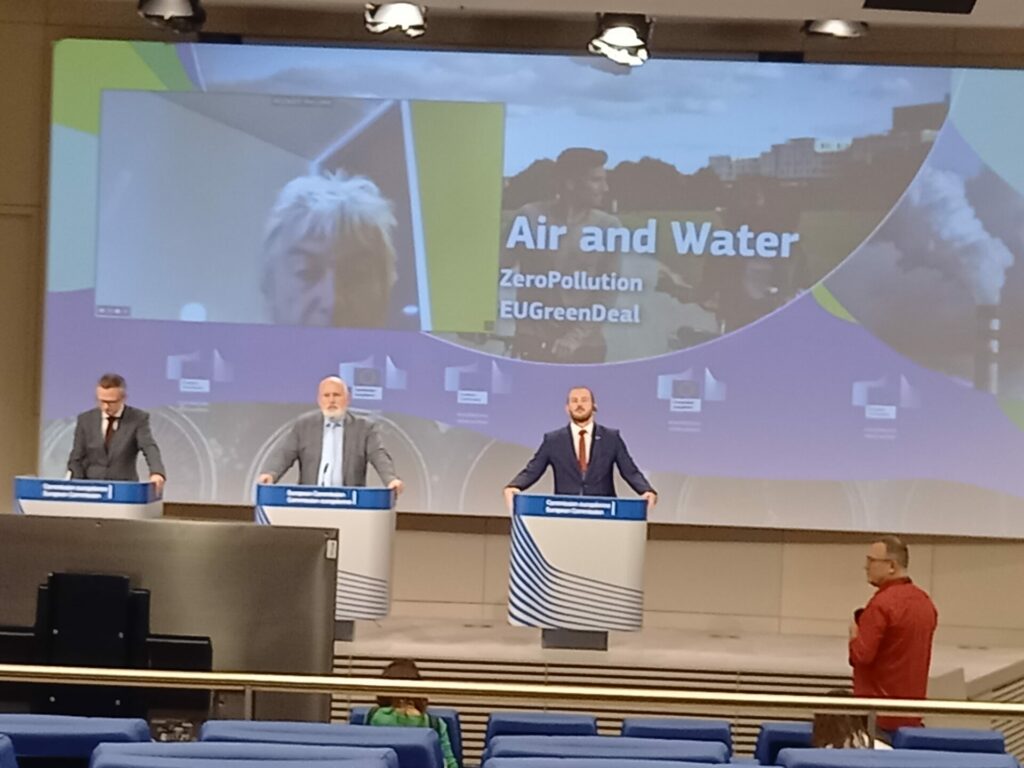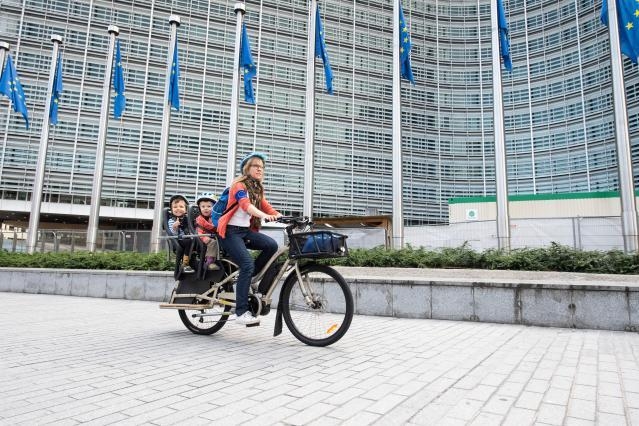The European Commission proposed on Wednesday stronger rules to improve Europe's air and water quality but it is still reluctant to include ecocide as an international crime in its own legislation on protecting the environment.
The proposals are part of the European Green Deal’s zero pollution ambition of having an environment free of harmful pollution by 2050. They also respond to specific demands of the Conference on the Future of Europe. However, as reported yesterday by The Brussels Times, the proposed revision of legislation has been heavily criticised by environmental groups for not being strict enough.
The Commission intends to revise the Ambient Air Quality Directives and the Urban Waste Treatment Directive and align them more closely with international standards and WHO guidelines. Another important directive in this context is an EU directive on the protection of the environment through criminal law which was proposed by the Commission in December last year.
According to Interpol and the United Nations Environment Programme, environmental crime is the fourth largest criminal activity in the world after drug trafficking, human trafficking and counterfeiting, growing at a rate between 5%-7% per year, two to three times the pace of global economic growth.
“Environmental crimes cause irreversible and long-term damage to people's health and the environment,” said Virginijus Sinkevicius, Commissioner for the Environment, Oceans and Fisheries when he presented the revised directive last year. While he was aware of the on-going discussion on ecocide, he said that the new directive only takes into account part of proposed ecocide legislation.
The scope and jurisdiction of the new directive is also limited to the EU member states. After the climate change conference in Glasgow last year, Commission Vice-President Frans Timmermans told The Brussels Times that there was no initiative at COP26 to transfer “legal personality to Mother Nature” in the sense that ecocide or the threat to biodiversity could be subject of litigation.
Ecocide could have been covered by COP26 since it is among others about protecting rainforests that serve as carbon sinks to reduce greenhouse gas emissions and limit global warming.
In July 2021, Vice-President Timmermans told The Brussels Times that that he did not reject the idea out of hand but thought that time was not yet ripe. He listed a number of reasons for the Commission’s position such as public opinion, alternative measures and the divide in competencies between the EU and its member states.
Since then, the idea of recognition of ecocide has gained more support and traction, both internationally and in the EU, in particular in the European Parliament. This week, the Parliament’s Committee on Environment, Public Health and Food Safety agreed on an opinion proposing amendments to the revised EU directive on the protection of the environment.
The committee called on the Commission to include the international crime of ecocide in the revised directive. In defining ecocide, the Committee followed the definition proposed by an expert panel brought together by the Stop Ecocide Foundation last June to amend the statutes of the International Criminal Court (ICC).

European Commission Vice-President Frans Timmermans (center) and Environment Commissioner Virginijus Sinkevicius (to the right) presenting the proposals for clean air and water at the press conference, 26 October 2022, credit: The Brussels Times
Legal definition of ecocide
The independent expert panel of top international criminal and environmental lawyers from around the world spent sixth months drafting the definition of “ecocide” as a potential 5th crime under the Rome Statute of the ICC. A new article was proposed to be added to the Statute where ecocide is defined as follows:
“For the purpose of this Statute, ‘ecocide’ means unlawful or wanton acts committed with knowledge that there is a substantial likelihood of severe and either widespread or long-term damage to the environment being caused by those acts.”
According to the proposal, two thresholds need to be met for the court to start investigating alleged ecocide.
The first is that an act has been committed with knowledge that there is a substantial likelihood of damage. The other one is that the act is unlawful in domestic or international law or wanton, meaning that it has been committed with reckless disregard for damage which would be clearly excessive in relation to the social and economic benefits anticipated.
Amending the Rome Statute is one pathway to criminalising ecocide. The other pathway is to seize the opportunity when the EU directive on the protection of the environment is going to be revised and include the recognition of ecocide as an international crime for which European companies can be liable to.
“If adopted into the revised directive, this could enable member states to prosecute the worst environmental harms which are not specifically addressed as serious crimes in any member state at present,” said Jojo Mehta, Chair of the Stop Ecocide Foundation, at a press conference on Wednesday morning before the Commission’s announcement of its proposals for cleaner air and water.
The Foundation has drafted a position paper with regard to the EU directive. “The revision of this directive is a crucial opportunity,” she added. Ecocide is a key root cause of climate and ecological crisis. Recognising it is about getting real - it’s about recognising that when we recklessly destroy the living world that sustains us, we put everything in jeopardy: our lives, our children, the future of our own species.”
She emphasised the importance of the definition of ecocide which emerged last year from the independent panel of legal experts convened by the Stop Ecocide Foundation. “The consensus definition has become the de facto starting point for governments considering the criminalisation of ecocide, at international, regional and domestic level.”
Parliament versus Commission
French MEP Marie Toussaint (Greens/EFA), who has made it her mission to work for the recognition of ecocide by the EU, was delighted after the ENVI vote. "This is the first step of very promising negotiations in the European Parliament.”
She confirmed that including the recognition of ecocide in the revised EU directive implies an extension of EU’s jurisdiction to non-EU countries and will make it possible to prosecute the crime of ecocide not only in EU member states.
Among others the ENVI committee writes in its opinion that, “This international approach to environmental crime should also include extending the scope of the International Criminal Court to the crime of ecocide, and the EU and its Member States have a key role and responsibility in this regard.”
Furthermore, “the Commission should, in close cooperation with the Member States 'monitor the justice systems' capacities to detect, prevent, respond, and prosecute environmental crimes as well as identify gaps and provide science-based and specialist recommendations and guidelines to better detect, investigate, prosecute or adjudicate environmental criminal offences.”
“Discussions will now continue in other competent committees, including in the legal affairs committee, but today's vote shows that there is a political majority in the European Parliament for the recognition of ecocide,” she added.
Sweden, where a new government with the support of the far right (Sweden Democrats) has been formed, will take over the EU presidency as of 1 January 2023. As such, it will play an important role in the discussions between the EU institutions on adopting the revised directive. One of its first decisions was to abolish the ministry of environment as a separate ministry.
“This might complicate things,” MEP Toussant told The Brussels Times. She was still optimistic considering the strong engagement in Sweden for the protection of the environment.
A stumbling block might rather be the European Commission judging by Vice-President Timmermans reply at the press conference on Wednesday to a question about the recognition of ecocide in the revised EU directive.
Asked by The Brussels Times about the vote in the European Parliament, he replied: “We obviously take votes in the parliament very seriously. We’ll study what the implications could be. If the parliament wants to go in that direction, we’ll look into it. But today I don’t feel that we are on firm legal ground to propose a legally useful instrument.”
“I wasn’t skeptical last year, if I remember correctly, about public opinion,” he stressed. “I was more skeptical about the legal aspects of the situation. To go from the political use of the term ecocide to a more workable legal definition might take time. We aren’t there yet. I used the term in a more understandable way referring to the threat of loss of biodiversity.”
In fact, there is already a legal definition of ecocide. The Commission did not respond to a question from The Brussels Times for clarification of Vice-President Timmerman’s reply at the press conference.
M. Apelblat
The Brussels Times

